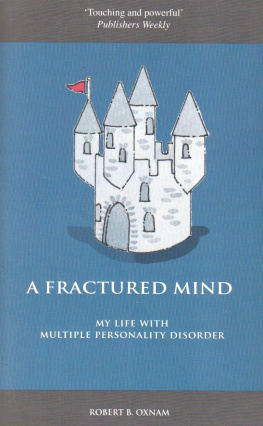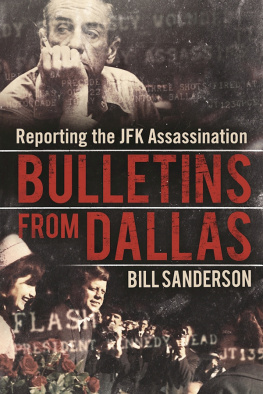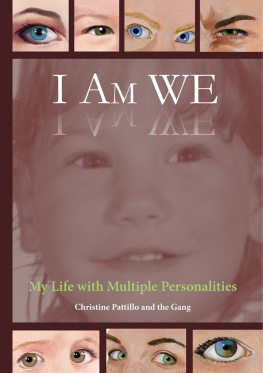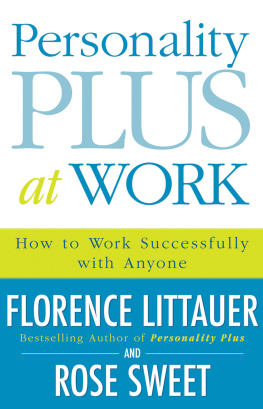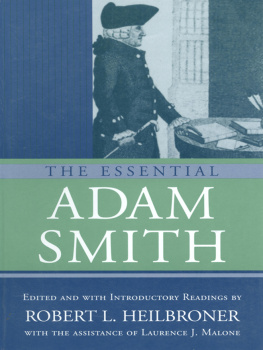A vivid narrative path into the recesses of one mans mind.
The New York Times
I was privileged to be among the first he trusted with his secret. A Fractured Mind is a story I urged him to tell.
Jane Pauley
Provides valuable insight into a courageous mans struggle.
Publishers Weekly
A remarkable life that, for all its successes, took great personal courage to survive and to publicly record.
Booklist


To my families
in the United States, India, and China
CONTENTS


All my life, now more than sixty years, Ive felt a kinship with Humpty-Dumpty, that hapless egg with human features who toppled from his perch. As a child, I often leafed through my English nursery rhyme book, staring at Humpty-Dumpty, proudly teetering on his wall, a fat little egg dressed as if going to some nineteenth-century London mens club, not a care in the world. There was only one illustration, a before portrait, leaving the reader to imagine Humpty-Dumptys fate after he splatted on the busy roadway below. Perhaps the story was poking fun at pretentious English merchants. Maybe it was to remind us of the biblical verse pride goeth before a fall.
What caught my attention was not the jolly before picture, but rather imagining the terrible aftermath of the fall, with a broken yolk, oozing whites, and eggshell fragments everywhere. It seemed impossible, but I wondered whether all the Kings horses and all the Kings men might find a way to put Humpty-Dumpty back together again.
Im quite serious. I thought long and hard about how it might be done. After all, I knew you didnt really need the yolk and the whites. Id seen those blown eggs at Easter time. Wasnt there some way to glue the broken eggshell pieces together and bring Humpty back to life?
Today I understand why Humpty-Dumpty caught my attention so many years ago. Multiple personality disorder (MPD) might just be called the Humpty-Dumpty disease, but psychiatrists now call it dissociative identity disorder (DID). I didnt know that I had MPD until 1990, when a remarkable psychiatrist, Dr. Jeffery Smith, made the diagnosis. Since then, I have met with several other dissociation specialists, mainly as a talking case study of an MPD patient. But I want to emphasize that I am neither a specialist in MPD nor a psychiatrist of any kind. What I have learned about the disorder comes from my own experience, from a few books Ive sampled since being diagnosed, and from the insights of Dr. Smith.
My name is Robert. Im one of eleven personalities whom youll meet in this book. At one time or another, all eleven personalities revealed themselves as part of one human being, officially called Robert Bromley Oxnam. On the outside, Robert B. Oxnam has done reasonably well for himself as a specialist on China and Asia, a published writer of both fiction and nonfiction about China, former president of the Asia Society, professor of Asian history and contemporary affairs.
But thats not the point. I want to be very clear that this is not an autobiography of Robert B. Oxnam. This book gives limited attention to what happened in the outer worldthe world of professional life, family ties, of relationships, of successes and failures. We did not write it to reveal who did what to whom. Instead, we wrote the book to convey our inner experiences with MPDsurprising discoveries, arduous therapy, and a lifetime of coping.
For those with MPD, these personal pronounsI and weget pretty confusing sometimes. Remember that I told you there were once eleven personalities. Now, Im proud to say, we have whittled it down to three remaining personalities through a process of integration. The three who remain Robert, Bobby, and Wandamade a joint decision to proceed with this book, and all three of us agreed to very clear rules about how it would be written.
Since Im the most outspoken in the group, I get the job of narrator, but dont think for a moment that either Bobby or Wanda is powerless. Quite the contrary, both are potent personalities, as you will discover. Indeed we agreed that, to portray accurately our inner divided reality, each of the eleven personalities would speak in his or her own voice.
So, in one sense, this book represents eleven autobiographies. But it also seeks to capture the constant inner monologues and dialogues that are common with multiple personality disorder. Life inside the world of MPD is filled with squabbles and power struggles, often over which individual personality will dominate on the outside. Since all of the personalities eventually communicated with Dr. Jeffery Smith, the book also reveals the enormous complexity of conducting therapy sessions with an MPD patient.
When Bobby and Wanda first pressured me to narrate this story, I was very reluctant. Imagine the daunting task of narrating the sixty-year history of eleven personalities to an outside world filled with people who have never experienced extreme dissociation. Wanda sought to persuade me with quietly passionate pleas: None of the rest of us is a writer. Its a story that should be told. Its eleven personalities in search of one soul. But I think it was Bobby, our naughty imp, who sold me. Robert, youre such a worrywart, Bobby said with a laugh. Its not such a big deal. Think of it this way. Youre the tour guide on the starship Enterpriseexploring the farthest reaches of inner space.
So, weBobby, Wanda, and Robertall decided that this book would not focus primarily on the outer world, which was really quite remote from many of us, but rather on our inner world of severe dissociation. We do not seek to destroy or protect reputations of anyone on the outside, living or dead, but rather to explore the inner MPD psyche that we have occupied.
But how can readers possibly believe this story? For a while, we all fretted about this issue. We vowed to tell the story as accurately as we could, letting each personality speak for himself or herself. We carefully corroborated our own recollections with the records and remembrances of Dr. Jeffery Smith in the long therapy process. We cross-checked our memories with several of those close enough to have witnessed our multiple personalities firsthand. Finally, we came to believe that we could do no more than that. The ultimate verdict on credibility will rest with you, the reader, after you have absorbed the story.
If this book raises more questions than it answers, then we will consider it a success, as long as the questions are more sophisticated by the end of the book than they were at the beginning. Indeed, it is our hope that you, the reader, will be asking questions throughoutnot only about us and our story, but also about yourself and the society in which we all live.
Over the past seven years, I, Robert, have related shortened versions of this story, always on a confidential basis, to roughly a hundred people, either individually or in small groups. With few exceptions, the response has been riveted attention, people often nodding their heads affirmatively as I described various personalities or inner episodes.
When I have asked why they were reacting so strongly, the response was almost always the same. Im nodding because its my story, too. Dont get me wrong. I dont have MPD. But I can really relate to different inner personae. Unlike people with MPD, I dont have memory blocks between those personae, but I act so differently with different people, in different places, at different times. One person elaborated: When I have a difficult decision to make, I always convene an inner committee meeting. I allow all parts of me to air opinions; that way I know that all of me owns the decision.

